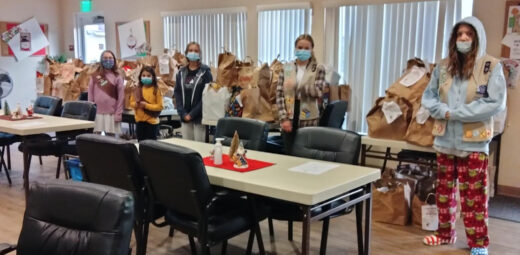
Dec 06Leaving No Kid Hungry
Every parent wants to send their kid to school feeling well-fed and healthy. At Mercy Housing, residents are leading a first-of-its-kind partnership effort with the national campaign No Kid Hungry (NKH) to improve food access in their communities.
Led by the organization Share Our Strength, the No Kid Hungry campaign has one goal: End childhood hunger in America. The campaign has been changing lives since 2010, mostly through collaborating with school districts to provide nutrition assistance to families. Last year, the resident-centered programming at Mercy Housing inspired the No Kid Hungry team to try something they never had before.
No Kid Hungry Launches New Programming at Two Mercy Housing Communities
“With a new grant from Share Our Strength, we are bringing the No Kid Hungry model to a housing community for the first time,” said Parag Gupta, Chief Program Officer for Mercy Housing, Inc. “Their mission maps onto Mercy Housing’s Resident Services priorities at the national level: ensuring families are food secure and can take control of their health and wellbeing. It’s been so exciting to implement this pilot program to benefit families at Mercy Housing California and Mercy Housing Southeast properties.”
“Mercy Housing was seen as a good choice to try this because we have deep, trusting relationships with residents, and we’re also large enough to make a real impact,” added Erik Krengel, Director of Family Resident Services at Mercy Housing California (MHC). “We have thousands of residents, as well as experienced staff, who are willing to put in time and energy to help those residents achieve their goals.”
The No Kid Hungry grant has funded staff time, research, materials, and food subscriptions that have made a transformational difference in residents’ lives. MHC piloted the program at two Northern California family communities that were selected based on the relative scarcity of fresh, affordable food and grocery stores in their neighborhoods. Mercy Housing Southeast has also piloted the program in some of its communities. More than 180 households in California have taken advantage of the new programs and services, including:
- Discounted and free food delivery services from nonprofit and corporate partners including Catholic Charities, Instacart, and DoorDash
- Field trips to local farmer’s markets
- Cooking and nutrition classes
- Support with public benefits and nutrition assistance
- Resident-led workshops and community meetings focused on collective problem-solving and knowledge-sharing
- A master calendar of food resources in the surrounding community
“Ultimately, the goal is to help empower Mercy Housing residents to take on this work for themselves,” said Liz Landa Campbell, Resident Services Manager II at MHC. At the kick-off meeting at each site, residents were vocal about the kinds of food support they needed to help their families thrive. Each community nominated two “resident champions” to receive compensation for creating an action plan for their community in partnership with MHC and NKH staff.
Program Success Leads to Grant Extension
The results have been stunning.
“In California, we’ve signed 51 residents up for deeply subsidized Instacart memberships. Plus, we’ve worked it out so they can use food stamps and SNAP benefits to pay for their Instacart orders. Some residents also signed up for a food delivery service from Catholic Charities,” said Liz.
For Serena, a Mercy Housing resident, the food delivery program made a big difference when getting to the grocery store was challenging. “Signing up for Instacart really helped when I was sick with COVID,” she said.
“I’m gaining weight since we started all of these food programs!” agreed Gale, another Mercy Housing resident, speaking to her increased access to healthy groceries. “I’m grateful to have this extra food as the prices for groceries have gotten higher.”
Resident champions are also leading weekly field trips to farmers’ markets and a nearby edible schoolyard garden. The extra support is well-timed, as the ending of pandemic emergency orders has reduced food stamp benefits for many families with low incomes.
“Finding quality, affordable food in these neighborhoods can be challenging, but these residents are super ‘grocery shopping smart,’” said Liz. “Our No Kid Hungry programs give them a great forum to share that knowledge. Someone will say, ‘The new produce comes to this store on Sunday, so I always go by Monday,’ or ‘I get toilet paper at Costco, but produce at the 99 Cent Store,’ or ‘Oh, you cook that vegetable that way? I cook it this way!’ It’s created a real sense of community and support for one another.”
Originally, No Kid Hungry planned to partner with Mercy Housing on a one-year pilot program. After noting the amazing results, however, the nutrition-focused nonprofit agreed to extend the grant for a second year, through September of 2024. The plan is to study the results of the pilot, which will inform future grantmaking decisions.
“We’re optimistic that we can demonstrate the success of this model, and that No Kid Hungry programs will start launching at affordable housing communities all over the country,” said Erik. “We have the opportunity to meet families where they already are – in this case, their home – which makes the impact of these services so much more powerful and sustainable.”
You may also like:
- Tackling Food Insecurity Despite having a stable home, many Mercy Housing residents worry about having access to enough...
- Celebrating Partnerships Across Our Region Mercy Housing – Colorado – Denver Police Department For the past year, The Denver Police...
Stay Up To Date
Get news on Mercy Housing and inspiring stories of change delivered to your inbox.


